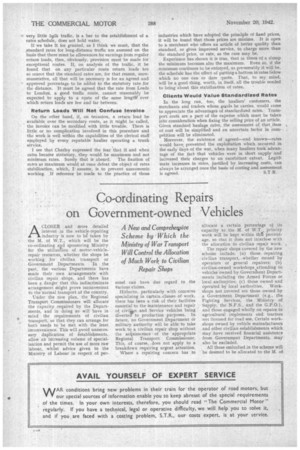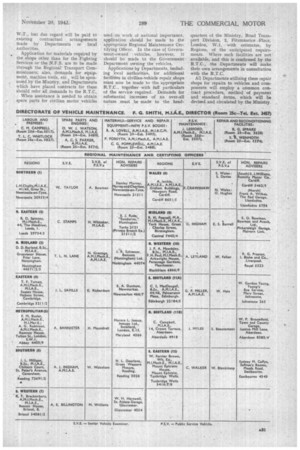Co-ordinating Repairs on Government-owned Vehicles
Page 40

Page 41

If you've noticed an error in this article please click here to report it so we can fix it.
A New and Compreherssive Scheme by Which the Ministry of War Transport Will Control the Allocation of Much Work to Civilian Repair Shops
ACLOSER and more detailed interest in the vehicle-repairing industry is now to be taken by the M. of W.T., which will be' the co-ordinating and sponsoring Ministry for the utilization of motor-vehiclerepair resources, whether the shops be working for crvilian transport or Government Departments. In the past, the various Departments have made their own arrangements with civilian repair shops, and there has been a danger that this indiscriminate arrangement might prove inconvenient to the normal transport of the country.
Under the new plan, the Regional Transport Commissioners will allocate' the capacity required by the Departments, and in doing so • will have in mind the requirements of civilian transport, so that they can arrange for both needs to be met with the least inconvenience. This will avoid unnecessary duplication of establishments, allow an increasing volume of specialization and permit the use of more raw labour, whilst advice given to the Ministry of Labour in respect of. per sonel can have due regard to the earious claims.
IIitherto, particularly with concerns specializing in certain .classes of work, there has been a risk of their facilities essential to the maintenance and repair of civilly) and Service vehicles being diverted' to production purposes. In future, no Government Department or military authority will be able to take work to a civilian repair shop without the acquiescence of the appropriate Regional Transport Commissioner. This, of course, , does not apply to a breakdown requiring urgent attention.
Where a repairing concern has to allocate a certain percentage of its capacity to the M. of W.T., priority work will be kept within thi% percentage, so that it does not interfevs with the allocation to civilian repair work.
The repair shops covered by the new scheme include: (a) those repairing civilian transport, -whether owned by operators or general repairers; (I)) civilian-owned workshops attending vehicles Owned by Government Departments including the Armed Forces or local authorities; (c) those owned and operated hy local authorities. Workshops not covered are thoSe owned by a Government Department (e.g., the Fighting Services, the 'Ministry of Supply, the N.F.S., and the G.P.O.), and those engaged wholly on repairs to agricultural implements and tractors not licensed for road use. Certain workshops owued by vehicle mainufacturers and other civilian establishments which may have received financial assistance from Government Departments, may also be excluded.
All those embodied in the scheme will be deemed to be allocated to the M. of W.T., but due regard will be paid to existing contractual arrangements made by Departments or local authorities.
Application for materials required by the shops other than for the Fighting Services or the N.F.S. are to be made through the Regional Transport Commissioners; also, demands for equipment, machine tools, etc , will be sponsored by the Ministry, and Departments which have placed contracts for these should refer all demands to the R.T.C.
When assistance is needed to obtain spare parts for civilian motor vehicles used -on work of national importance, application should be made to the appropriate Regional Maintenance Certifying Officer. In the case of Government-owned vehicles, however, it should be made to the Government Department owning the vehicles.
Applications by Departments, including local authorities, for additional facilities in civilian-vehicle repair shops must now be made to the appropriate R.T.C., together with full particulars of the service required. Demands for substantial increases of an over-all nature must be made to the head quarters of the Ministry, Road Transport Division, 2, Fitzmaurice -Place, London, W.1, with estimates, by Regions, of the anticipated requirements. Where such facilities are notavailable, and this is confirmed by the R.T.C., the Departments will make their own arrangements in consultation with the R.T.C.
All Departments utilizing these repair shops for repairs to vehicles and components will employ a common contract procedure, method of payment and standard forms, which will be devised and circulated by the Ministry.




























































